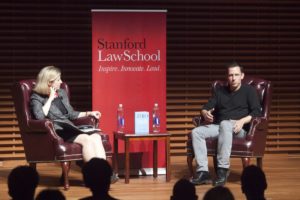Peter Thiel’s Quest for One-of-a-Kind Ideas
If he had it to do over again, Peter Thiel said, “I’d still go to Stanford, I’d probably go to law school.” But, he told a packed audience at Stanford on Monday night, when he was young he was probably too driven by the need for prestige. Now he believes, “There is no wisdom in crowds. There is ferocious competition! This is anti-Malcolm Gladwell.”

Thiel came to campus to discuss his belief that every great company is built around a secret, which is one of the key themes from his new book, Zero to One: Notes on Startups, or How to Build the Future. His visit was sponsored by Stanford Law School and the Business Association of Stanford Entrepreneurial Students (BASES). M. Elizabeth Magill, dean and Richard E. Lang Professor of Law at Stanford Law School, moderated the Q&A session after Thiel spoke.
After he founded PayPal, Thiel made a wise investment in Facebook and startled many with his and $100,000 grants to teens who “stop out” of school, Thiel earned a BA/BS (’89) at Stanford and a JD (’92) from Stanford Law School. It was, he said, “where I feel my whole life began.”
Just a few years later, he found himself at a New York law firm “where everyone on the outside wanted to get inside and everybody on the inside wanted to get outside.” He lasted seven months and three days.
His current focus is to find “one-of-a-kind companies where people are on a mission to do something no one has done before.” Instead of competing against other businesses for market share, he said, “It should be the goal of every company to be a monopoly.” He gave the example of a restaurant in Palo Alto trying to distinguish itself from many competitors by claiming to serve the only British food in town, whereas a monopoly like Google “basically has had no competition in search since 2002.”
Because we’re taught that competition is valuable, it’s a hard habit to break, Thiel said. “Yet when the differences are small, you have to fight much harder to differentiate yourself.” He recalled Henry Kissinger’s description of his fellow faculty members at Harvard: “The battles are ferocious because the stakes are so low.” Sometimes people are so busy fighting to get through a small gate, Thiel noted, they overlook the large door around the corner.
People also get talked out of their ideas before they fully form them, convinced by others that they’re strange or weird. Or they don’t even try to think of something new because they figure that things that haven’t been discovered are too hard to figure out. “If you think there are no secrets to be found, you are not the person who will find them,” Thiel said.
